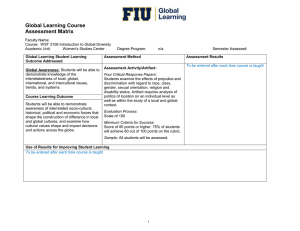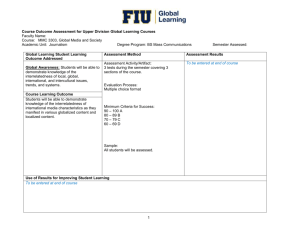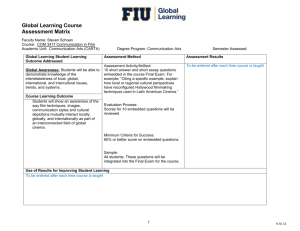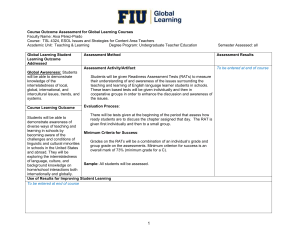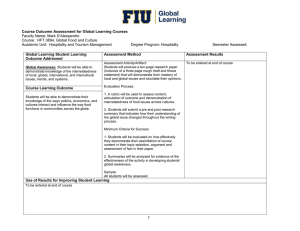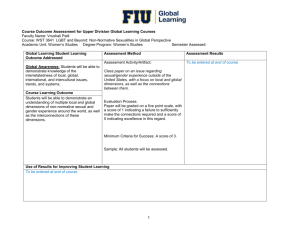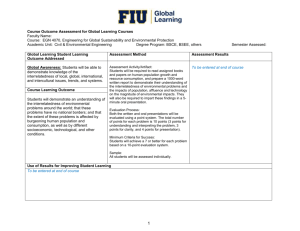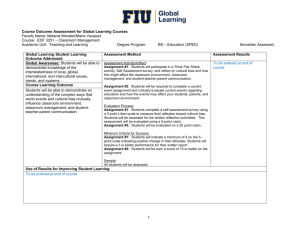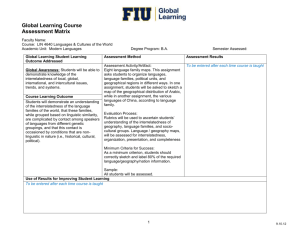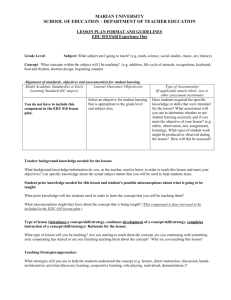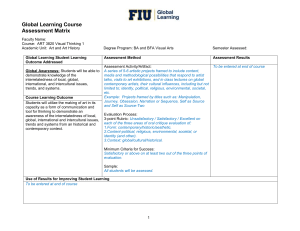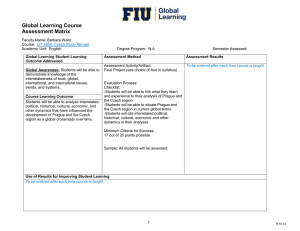Expanded Statement of Institutional Purpose
advertisement
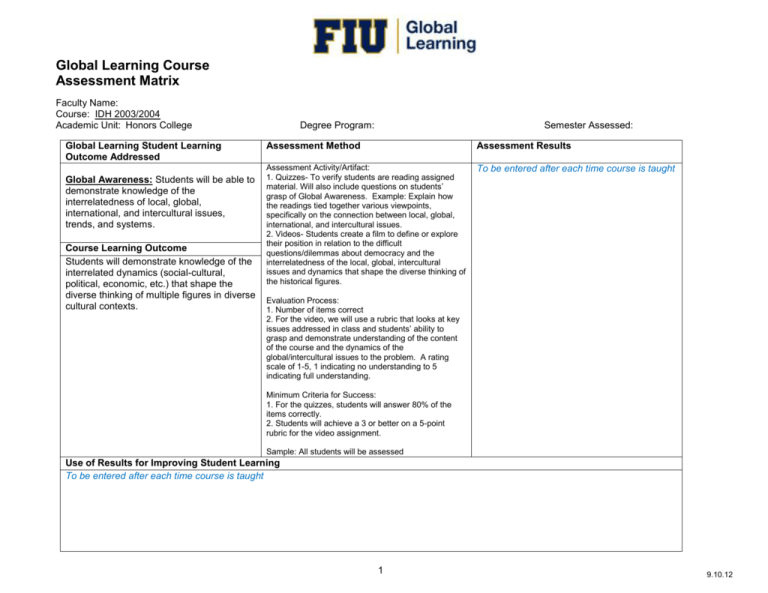
Global Learning Course Assessment Matrix Faculty Name: Course: IDH 2003/2004 Academic Unit: Honors College Global Learning Student Learning Outcome Addressed Global Awareness: Students will be able to demonstrate knowledge of the interrelatedness of local, global, international, and intercultural issues, trends, and systems. Course Learning Outcome Students will demonstrate knowledge of the interrelated dynamics (social-cultural, political, economic, etc.) that shape the diverse thinking of multiple figures in diverse cultural contexts. Degree Program: Semester Assessed: Assessment Method Assessment Results Assessment Activity/Artifact: 1. Quizzes- To verify students are reading assigned material. Will also include questions on students’ grasp of Global Awareness. Example: Explain how the readings tied together various viewpoints, specifically on the connection between local, global, international, and intercultural issues. 2. Videos- Students create a film to define or explore their position in relation to the difficult questions/dilemmas about democracy and the interrelatedness of the local, global, intercultural issues and dynamics that shape the diverse thinking of the historical figures. To be entered after each time course is taught Evaluation Process: 1. Number of items correct 2. For the video, we will use a rubric that looks at key issues addressed in class and students’ ability to grasp and demonstrate understanding of the content of the course and the dynamics of the global/intercultural issues to the problem. A rating scale of 1-5, 1 indicating no understanding to 5 indicating full understanding. Minimum Criteria for Success: 1. For the quizzes, students will answer 80% of the items correctly. 2. Students will achieve a 3 or better on a 5-point rubric for the video assignment. Sample: All students will be assessed Use of Results for Improving Student Learning To be entered after each time course is taught 1 9.10.12 Global Learning Course Assessment Matrix Faculty Name: Course: IDH 2003/2004 Academic Unit: Honors College Global Learning Student Learning Outcome Addressed Global Perspective: Students will be able to conduct a multi-perspective analysis of local, global, international, and intercultural problems. Course Learning Outcome Students will be able to analyze the multiple causal forces that shape the perspectives of historical individuals/persons — economic, political, sociological, technological, cultural, etc.—and their resulting differing perspectives. Degree Program: Semester Assessed: Assessment Method Assessment Results Assessment Activity/Artifact: Students will write a 4 page (1,200-word) paper describing the historical character they will be portraying. Students must understand their characters’ unique perspectives: opinions, motivations and pressure points. Additionally, students must demonstrate an understanding of the multiple causes of these perspectives. Students will demonstrate how the character’s unique perspective comes into play when solving problems in a team in which many perspectives must be borne in mind. To be entered after each time course is taught Evaluation Process: A rating scale of 1-5, 1 indicating no understanding to 5 indicating full understanding. Minimum Criteria for Success: Students will achieve a 3 or better on a 5-point rubric. Sample: All students will be assessed. Use of Results for Improving Student Learning To be entered after each time course is taught 2 9.10.12 Global Learning Course Assessment Matrix Faculty Name: Course: IDH 2003/2004 Academic Unit: Honors College Global Learning Student Learning Outcome Addressed Global Engagement: Students will be able to demonstrate willingness to engage in local, global, international, and intercultural problem solving. Course Learning Outcome Students will demonstrate a willingness to engage in negotiation in order to reach evidence-based conclusions. Degree Program: Semester Assessed: Assessment Method Assessment Results Assessment Activity/Artifact: Students will engage in negotiation during the live sessions of Reacting to the Past. To be entered after each time course is taught Evaluation Process: Rubric: A rating scale of 1-5, 1 indicating no willingness to engage to 5 indicating full engagement. Minimum Criteria for Success: Students will achieve a 3 or better on a 5-point rubric. Sample: All students will be assessed. Use of Results for Improving Student Learning To be entered after each time course is taught 3 9.10.12
